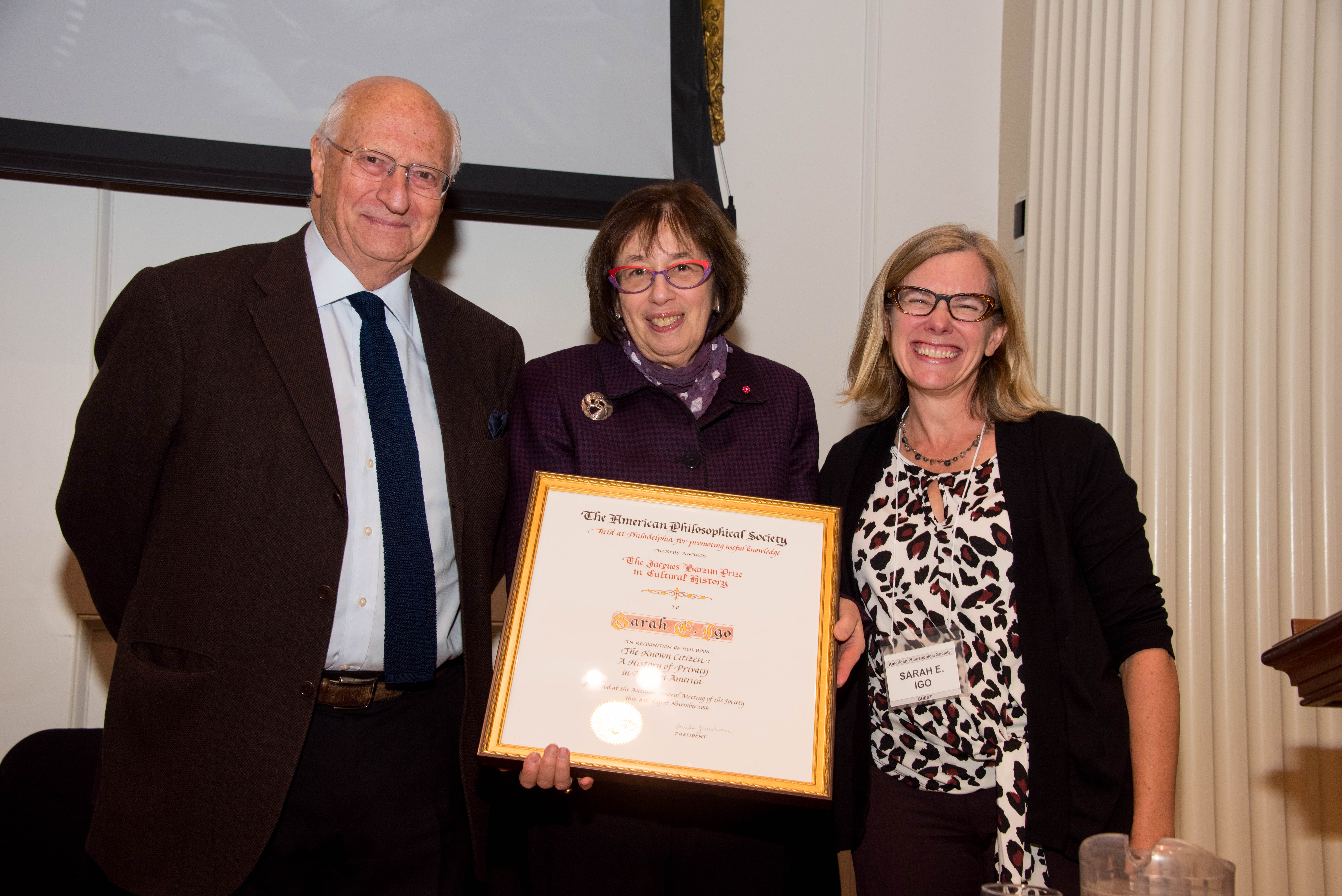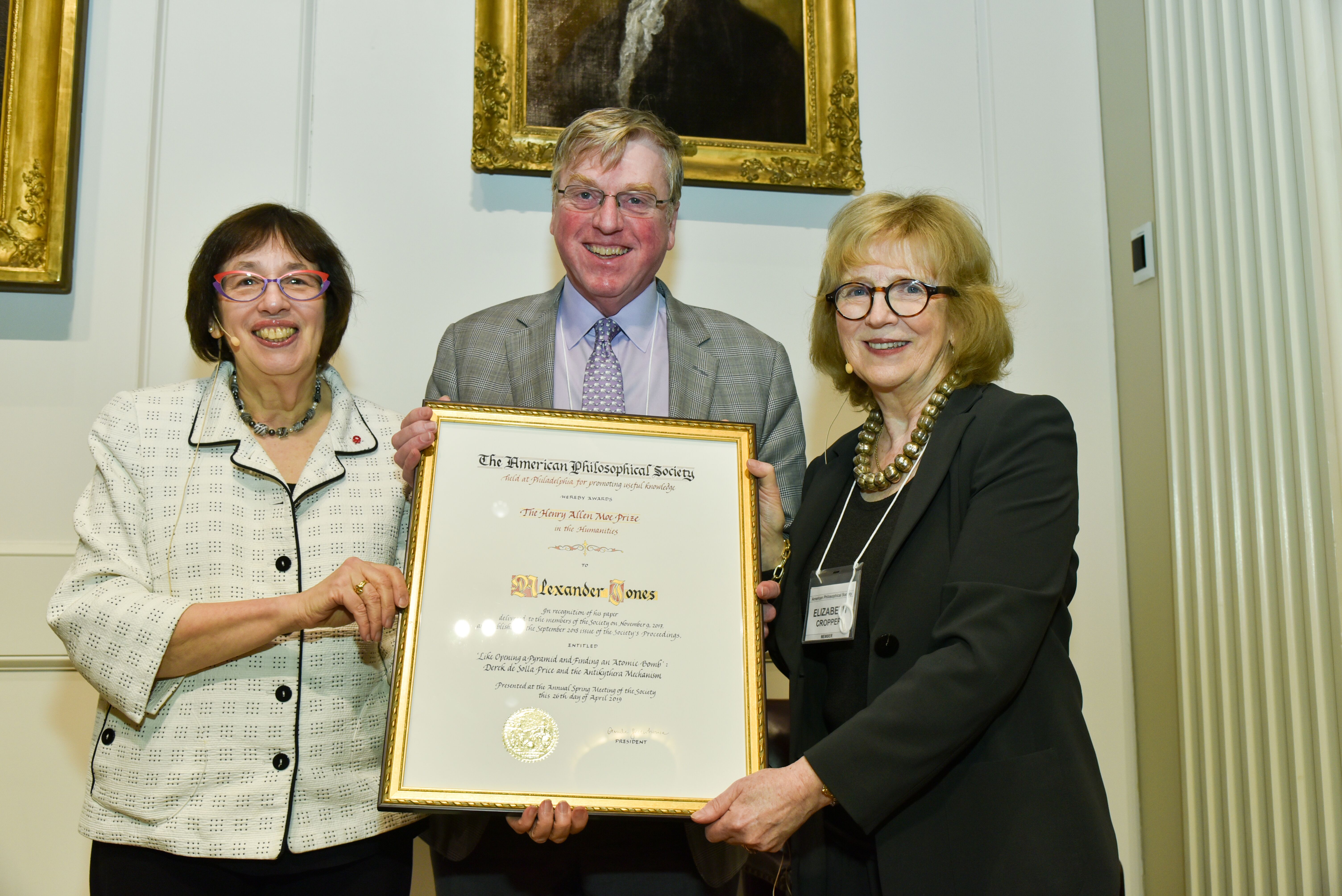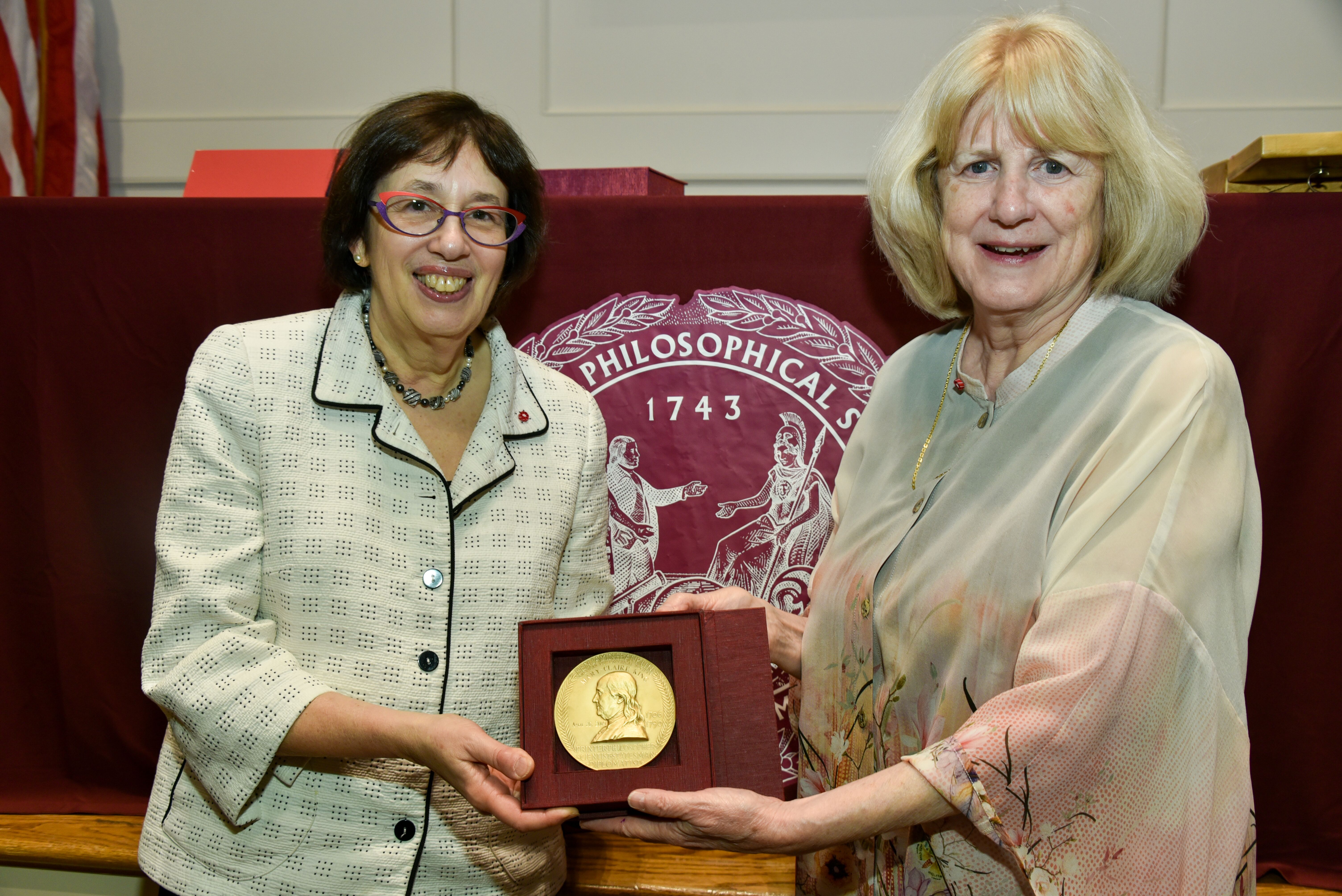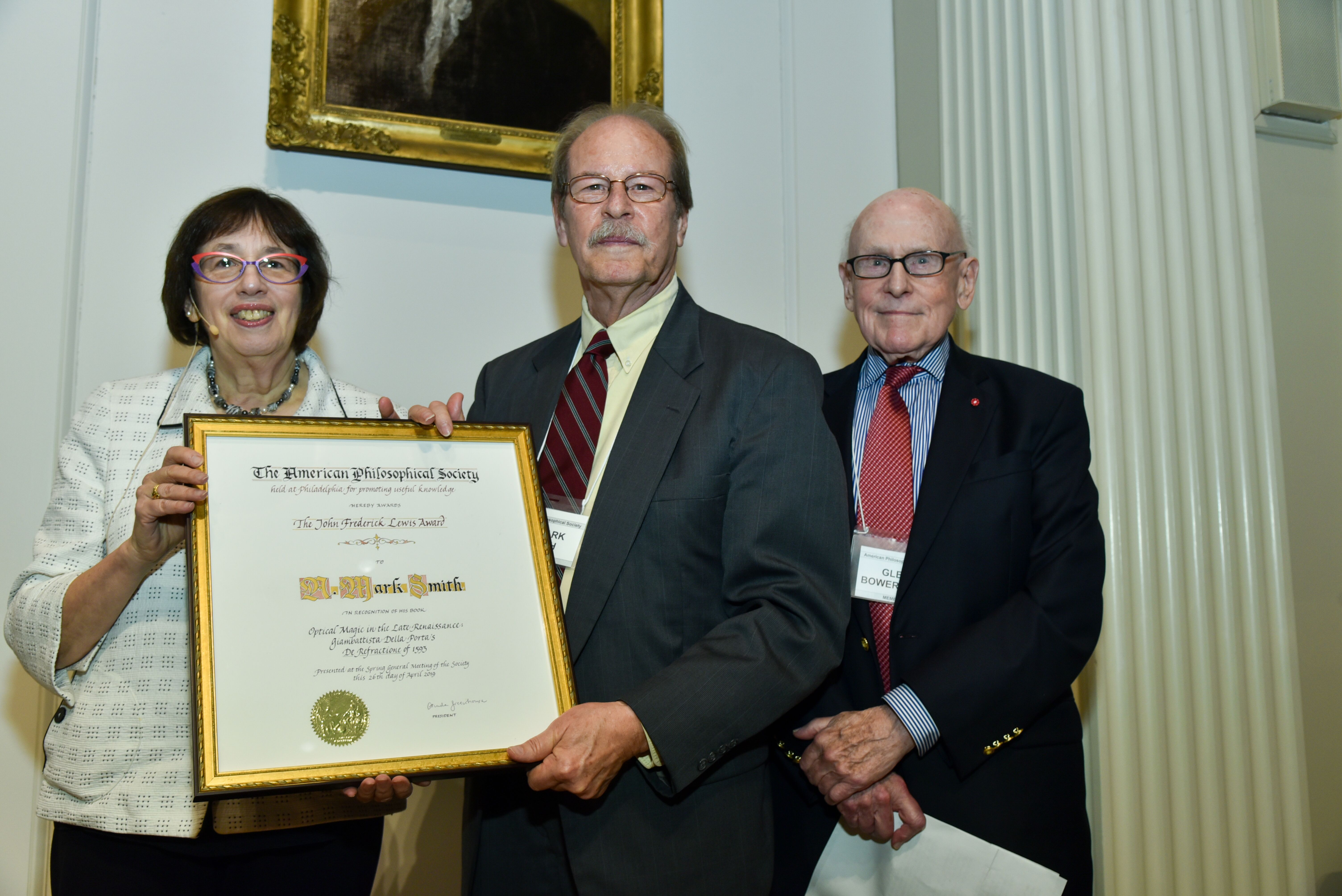About the Forum
Inspired by the work of the Center for Native American and Indigenous Research (CNAIR), the APS Library & Museum's Indigenous Learning Forum (formerly the Indigenous Studies Seminar Series) is a space for sharing Indigenous-led and community-engaged projects, as well as research in Native American and Indigenous Studies and related fields.
Forum sessions are held roughly once a month between November and May, on Thursdays at 3 pm Eastern. They are held over Zoom. Registration is required and free, and open to attendees of all backgrounds and affiliations. Presenters represent diverse Indigenous communities, professional and scholarly fields, and career levels. Some past presentations are available on our Indigenous Learning Forum playlist on YouTube.
Se ofrecerá interpretación en español/inglés para todas las presentaciones.
Spanish/English interpretation will be offered for all presentations.
Questions should be sent to Ruth Rouvier, Native American Scholars Initiative Engagement Coordinator, at [email protected].
***Call For Proposals / Convocatoria de propuestas***
- Submission Deadline: Monday, May 19, 2025
- Fecha límite de presentación: Lunes, 19 de mayo de 2025
(VERSIÓN EN ESPAÑOL A CONTINUACIÓN)
***ENGLISH VERSION***
The Indigenous Learning Forum, hosted by the Center for Native American and Indigenous Research at the American Philosophical Society’s Library & Museum, invites proposals for our 2025-2026 monthly virtual speaker series.
The Indigenous Learning Forum (ILF) is a space for sharing Indigenous-led and community-engaged projects, as well as research in Native American and Indigenous Studies and related fields. It is a forum for community-based initiatives and academic work alike. We are particularly interested in work which highlights innovative and impactful uses of archival and museum collections in research, teaching, and learning. Past presentations have shared projects on river-based teaching and learning, Zapotec language teaching, using archival materials in support of creative projects, and Indigenous approaches to research, among other topics. You can find a full list of previous presentations on our ILF webpage, and view recordings of selected presentations on our YouTube channel.
We welcome proposals from individuals, co-presenters, or groups working in a broad range of community settings and/or academic fields, and encourage those that involve collaborative and interdisciplinary approaches. The series is open to all practitioners and scholars, whether campus- or community-based. Our intentions are to create a supportive environment in a way that allows people to share important work, and in doing so contributes to our broader goals of engaging in conversation and building community.
We will meet over Zoom roughly once a month, from September through May, on Thursdays at 3 pm Eastern. We offer a flexible format for our one-hour sessions, and are happy to accommodate a range of types of presentations, including round-table or panel discussions, project demonstrations, interactive workshops, and sharing of creative works. We invite participants to tell us what format will fit their needs best. All presentations will feature live Spanish/English interpretation.
To submit a proposal, please submit the following materials using this Google Form by Monday, May 19, 2025. Proposals will be accepted in English or Spanish.
- a one-page proposal
- a brief statement (2-3 sentences) describing presenter(s) engagement with or membership in the community or communities your presentations addresses
- Your resume or CV
If you have questions, please direct them to Ruth Rouvier, Native American Scholars Initiative Engagement Coordinator, at [email protected]. To learn more about the series and see a listing of past presentations, visit the Indigenous Learning Forum page on the APS website.
About the Center for Native American and Indigenous Research
The Center for Native American and Indigenous Research (CNAIR) at the APS’s Library & Museum works with Indigenous communities throughout the Americas and with campus- and community-based scholars in many disciplines and traditions. Its goal is to assist people in finding and utilizing the extensive archival collections at the Library and Museum of the APS in innovative ways that honor Indigenous knowledge, cultivate scholarship, and strengthen languages and cultural traditions. The Library & Museum’s collections contain over 2,500 linear feet of unique manuscripts, photographs, and audio recordings relating to the languages, traditions, history, and continuity of more than 650 different cultures throughout the Americas. The Indigenous Subject Guide provides detailed information for locating materials in these collections.
***VERSIÓN EN ESPAÑOL***
El Foro de Aprendizaje Indígena, auspiciado por el Centro de Investigación Indígena y Nativo Americana de la Biblioteca y Museo de la Sociedad Filosófica Americana, invita a presentar propuestas para nuestra serie de conferencias virtuales mensuales 2025-2026.
El Foro de Aprendizaje Indígena (ILF) es un espacio para compartir proyectos liderados por personas indígenas comprometidas con la comunidad, así como investigaciones en Estudios Nativos Americanos e Indígenas y campos relacionados. Es un foro tanto para iniciativas comunitarias como para trabajos académicos. Nos interesan especialmente los trabajos que pongan de relieve los usos innovadores y significativos de las colecciones de archivos y museos en la investigación, la enseñanza y el aprendizaje.
Las presentaciones anteriores han compartido proyectos sobre la enseñanza y el aprendizaje basados en el río, la enseñanza de la lengua zapoteca, el uso de materiales de archivo en apoyo de proyectos creativos y los enfoques indígenas de la investigación, entre otros temas. Puede encontrar una lista completa de las presentaciones anteriores en nuestra página web ILF, y ver las grabaciones de las presentaciones seleccionadas en nuestro canal de YouTube.
Son bienvenidas propuestas individuales y grupales que se refieran a entornos comunitarios y/o campos académicos, y animamos particularmente a aquellos que impliquen enfoques colaborativos e interdisciplinarios. El ciclo está abierto a todas las personas involucradas en procesos comunitarios, profesionales, académicas, y expertas tanto universitarios como comunitarios. Nuestra intención es crear un entorno de apoyo que permita a la gente compartir trabajos importantes y, al hacerlo, contribuya a nuestros objetivos más amplios de entablar conversaciones y crear comunidad.
Nos reuniremos a través de Zoom aproximadamente una vez al mes, de septiembre a mayo, los jueves a las 15.00, hora del Este. Ofrecemos un formato flexible para nuestras sesiones de una hora, y nos complace dar cabida a diversos tipos de presentaciones, como mesas redondas o paneles de debate, demostraciones de proyectos, talleres interactivos y puesta en común de trabajos creativos. Invitamos a los participantes a que nos digan qué formato se adapta mejor a sus necesidades. Todas las presentaciones contarán con interpretación en directo español/inglés.
Para presentar una propuesta, envíe los siguientes materiales al formulario de Google antes del lunes 19 de mayo de 2025. Se aceptarán propuestas en inglés o español.
- Propuesta de presentación (una página)
- Declaración breve (2-3 frases) sobre el compromiso o la pertenencia del presentador o presentadores a la comunidad o comunidades a las que se dirige su presentación
- Currículum
Si tiene alguna pregunta, escriba a Ruth Rouvier, Coordinadora de la Iniciativa para la Participación de Investigadores Nativo Americanos, a través de este correo [email protected]. Para obtener más información sobre la serie y ver una lista de las presentaciones anteriores, visite la página del Foro de Aprendizaje Indígena en el sitio web de la APS.
Acerca del Centro de Investigación Indígena y Nativo Americana
El Centro de Investigación Indígena y Nativo Americana (CNAIR) de la Biblioteca y Museo de la APS trabaja con comunidades indígenas de todo el continente americano y con académicos universitarios y comunitarios de muchas disciplinas y tradiciones. Su objetivo es ayudar a las personas a conocer y utilizar las extensas colecciones de archivos de la Biblioteca y Museo de la APS de formas innovadoras que honren el conocimiento indígena, cultiven la erudición y fortalezcan las lenguas y tradiciones culturales. Las colecciones de la Biblioteca y el Museo contienen más de 2.500 manuscritos únicos, fotografías y grabaciones de audio relacionadas con las lenguas, las tradiciones, la historia y la continuidad de más de 650 culturas diferentes de todo el continente americano. La Guía de materiales indígenas proporciona información detallada sobre el contenido de estas colecciones y cómo localizarlos.
Upcoming Presentations
Spring 2025
Thursday, May 8: Anca Wilkening (Harvard University), Ian McCallum (Munsee-Delaware First Nation/University of Toronto), Velma Noah Nicholas (Delaware Nation at Moraviantown/University of Victoria), “Akiinziitookw - Let's Read Together!” Collaborative Interpretation of Moravian Munsee Lenape Manuscripts and Ancestral Voices at Harvard’s Houghton Library"
Past Presentations
Spring 2025
Thursday, March 20: Emily Jean Leischner (American Philosophical Society), "Activating Nuxalk Ancestral Governance to Protect the Nuxalk Language with the American Philosophical Society (APS)"
Thursday, February 20: Jessica Locklear (Lumbee/Emory University), "Following the Pines: Lumbee Mobility and Indian Identity in the Deep South"
Thursday, January 23: Andrew Abdalian (American Philosophical Society) "Just one more quick edit: Lessons from the making of the Tunica Language Textbook"
Fall 2024
Thursday, September 12: Kaylen James (Itazipco Lakota/Mdewakantunwan Dakota/University of Minnesota-Twin Cities) and Dr. Samantha Majhor (Fort Peck Assiniboine and Sioux Descendant/Marquette University), "Remembering from the Heart and Mind: Oceti Sakowin Approaches to Digital Archiving and Website Design"
Thursday, November 7: Raul Macuil Martínez (Universidad Pedagógica Nacional. Unidad 131-Hidalgo, México), "Patrimonio documental comunitario en náhuatl de Tlaxcala, México"
Thursday, November 21: Rosalba Gomez Bautista (Mixtec (Ñuu Saví - People of the Rain)/Sacramento State University), "Resistance Beyond Displacement: How Indigenous Migrants in Oaxaca, Mexico Redefine Resistance Beyond Transnational Borders 1980-2020"
Thursday, December 5: Annemarie Gillies (Ngā Hapū o Waimārama /Te Kura I Awarua, Eastern Institute of Technology) and Tākuta Xavier Forde (Ngāti Huia/Te Kotahi Research Institute, University of Waikato), "Te Taunaha i ngā Tapuwae ō mātou Tīpuna/Reclaiming the footprints of our Ancestors: Piloting the use of Traditional Knowledge Labels by Ngā Hapū o Waimārama for their archaeological sites in Aotearoa New Zealand"
Spring 2024
Thursday, January 18: Rayo Cruz (Bëni Xidza Collective/Universidad de Guadalajara, México), "La enseñanza del Zapoteco como segunda lengua/Teaching Zapotec as a second language"
Thursday, February 15: Jacqueline S. Campo (University of Massachusetts Boston), "Limeños andinos: Narratives of indigenous Quechua migrants from the Andes to Lima, the capital of Peru"
Thursday, March 21: Jennifer Komorowski (Oneida Nation of the Thames/Toronto Metropolitan University) and Nyssa Komorowski (Oneida Nation of the Thames/University of Toronto), "Ukwehuwe Stories: A Philosophy and History of Being in the World"
Thursday, April 18: Keith Richotte, Jr. (Turtle Mountain Band of Chippewa Indians/University of North Carolina - Chapel Hill), "The Worst Trickster Story Ever Told: Native America, Plenary Power, and the U.S. Constitution"
Fall 2023
Thursday, November 2: Alexandra Lamiña (Kitu-Kara/University of Texas at Austin/APS), "Indigenous Countertopography of Femicide: Witnessing the Modern Gender Genocide"
Thursday, November 30: Hali Dardar (United Houma Nation/Smithsonian), "Archival Material in Media Art – the 2023 Indigenous Gulf Stream"
Spring 2023
Thursday, February 9: Mneesha Gellman, Emerson College, "Learning to Survive: Native American and Immigrant-Origin Youth Wellness in Schools"
Thursday, March 30: Ian McCallum, University of Toronto, "Asiiskusiipuw"
Thursday, May 25: Joseph Dupris, University of Colorado Boulder, "The American Indian in western linguistic inquiry: Toward tribalized language research"
Fall 2022
Friday, October 28: Marlen Rosas, Haverford College, "Contending Visions of Indigenous Education in Ecuador: The Potential of the Radical 1940s."
Friday, December 16: David Dry, University of North Carolina at Chapel Hill, "Advocating for Allotment: Civil Rights and Sovereign Ends."
Spring 2022
Friday, January 21: Blake Grindon, Princeton University, “The Mohawk Atlantic in the Age of Revolution: Cultural Brokerage and the Politics of Alliance, 1775-76"
Friday, February 18: Eli Nelson, Williams University, "Transing the first Native American Doctor."
Friday, April 22: Alejandra Dubcovsky and George Aaron Broadwell, University of California Riverside and University of Florida, "Cumenatimococo, With all our Heart: Native Literacy and Power in Colonial Florida."
Friday, May 13: Robert Caldwell, Brown University, " Albert Gallatin, philology and the emergence of ethnological mapping in the United States: Natural Sciences and Republican Ideals."
Spring 2021
Friday, January 22: Patrick Lozar, University of Victoria, "'Home was, part of north of the line, and part of the time south of it': Families, Belonging, and Status in a Persistent Borderland."
Friday, February 12: Mary McNeil (Harvard University), "The Factory of Genocide: Deer Island’s Carceral Geography"
Friday, March 19: Elizabeth Ellis (New York University), " Remembering, Forgetting, and Mythologizing the Petites Nations”
Friday, April 16: Thompson Smith, Tribal History and Ethnogeography Projects, Séliš-Ql̓ispé Culture Committee, Confederated Salish & Kootenai Tribes, "Sk͏ʷsk͏ʷstúlex͏ʷ — Names Upon the Land: A Geography of the Salish and upper Kalispel People"
Friday, May 14: Katrina Srigley (Nipissing University) and Glenna Beaucage (Culture and Heritage Department, Nipissing First Nation), "Contributions to Ngodweyaan (Family) and Ezhidaayang (Community) on and beyond Nbisiing Nishnaabeg Territory"
Spring 2020
Friday, February 7: Jessica Locklear, Temple University, “A History of Lumbee Migrations to Philadelphia, Pennsylvania, 1945-2004; Chapter 2: A Lumbee Church on Frankford Avenue, 1965-2004”
Friday, March 6: Rosanna Dent, New Jersey Institute of Technology, “Bureaucratic Vulnerability: Possession, Sovereignty, and Relationality in Brazilian Research Regulation”
Friday, April 24: Cindy Ott, University of Delaware, "Ranch Work: Conflict, Compromise & Collaboration Among Historic Rivals," chapter 1 of Biscuits & Buffalo: Reinvention of American Indian Culture in the Twentieth and Twenty-First Centuries
Friday, May 15: Peter Olsen-Harbich, The College of William & Mary, “"Quand ung homme a desservi mort” (When a Man Deserves to Die): Encountering Coercion in the Medieval Eastern Woodlands, 1501-1611”
Fall 2020
Friday, November 6: Shandin Pete, Salish Kootenai College, “A Review of Salish Astronomical Knowledge".
Friday, December 18: Jermani Ojeda Ludeña, University of Texas at Austin, “Using Media to Promote Quechua Culture and Identity in the Peruvian Andes"
Fall 2019
September 18: Morgan Ridgway, University of Illinois Urbana-Champaign and 2018-2019 Andrew W. Mellon Foundation Native American Scholars Initiative (NASI) Predoctoral Fellow, "(Re)Thinking Indian: The Handbook of the North American Indian and the Body in the Decade of the Bicentennial"
October 30: April Anson, Mellon Postdoctoral Fellow, Penn Program for the Environmental Humanities, "Master Metaphor: Environmental Apocalypse and the Settler State of Emergency"
December 10: Kate Riestenberg, Postdoctoral Fellow in Linguistics, Bryn Mawr College, "Promoting Zapotec language learning through meaningful social interaction"




